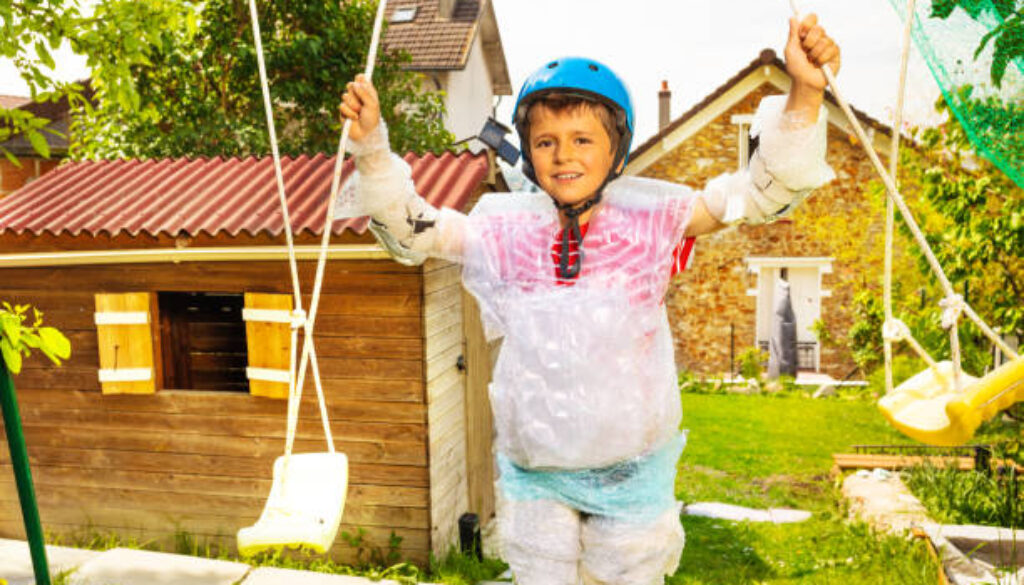Excessive Bubble Wrapping – A Disservice to Children
Menanteau Serfontein – 5 November 2021
Parents are the key facilitators for their children to become capable, confident, independent, resilient and well-adjusted citizens, who take full responsibility for their lives as well as for the consequences of their actions and behaviour.
The vast majority of parents raise their children to the best of their ability in accordance with their own worldview and understanding, as well as their personal psychological make-up. One of the tendencies that has gained momentum over the past few decades, is that parents have become increasingly overprotective of their children.
Overprotective parenting is usually done with the purest intentions. Unfortunately, quite the opposite effects are created in children who have excessively overprotective parents. This follows them well into adulthood. In fact, overprotective parenting does more harm than good.
What Does Overprotective Parenting Mean?
Overprotective parenting means that protectiveness is exaggerated. Overprotective or helicopter parents want to ensure that their children will not be physically or emotionally hurt. They want to protect their children from harm, pain, unhappiness, negative experiences, rejection, failure and disappointments.
They attempt to do this by:
- providing constant surveillance and restrictions
- wanting to control their children’s environment and actions as well as with whom they choose to spend their time
- being over-involved in their children’s daily life and decisions
- encouraging safety and dependence over autonomy and exploration
- always knowing what’s best for their child and emphasizing this to them
- doing every chore and task for their kids
- not allowing their children to adapt, solve problems and learn the skills required to deal with issues themselves.
- when kids display antisocial behavioural patterns, some parents feel uncomfortable about being strict about boundaries (limits) and rules.
They often build a “golden cage” for their children; it keeps them safe from harm, but it is a cage nonetheless. As a result, later on in adulthood, these children may be reluctant to spread their own wings and fly.
When these children become adults, they still have to face the “cruel world”, but lack the life skills to effectively do so, because they were kept within a glass bowl all along.
Implications of Overprotective Parenting
- Low Self-Esteem and Self-Worth
Children from overprotective households tend to have low self-esteem and self-worth and may lack the resilience and confidence that are essential in order to face the world.
By showering their child with inordinate attention and trying to continually keep them safe from harm, these parents hope to show their children just how precious and valuable they are.
Many overprotective parents may emphasize to their kids how special and unique they are, how they only deserve the very best, how no one-should ever hurt them or treat them unfairly – which often results in these children developing a rather ungrounded sense of entitlement.
The underlying message that overprotectiveness transfers to children, is that they are not really capable, competent or good enough in order to manage life by themselves. By constantly being monitored and protected, children do not have the opportunity to prove to themselves that they can accomplish things by themselves.
- Prone to Fearfulness and Anxiety and Being Risk Averse
Overprotective parenting often leads to over-sensitive adults, as a result of the parents’ anxiety being reinforced in their children.
Overprotective parenting stems from anxiety to begin with: the parent worries excessively that their child can easily be physically or emotionally hurt. Thus, they strive to protect them.
It can continue well into adult life, when the parent is constantly afraid that something terrible will happen to their child, thus offering their protection, advice and opinion in any situation. By then, the adult child is already quite anxious and may gladly accept the intervention of their parents, or just feel powerless against it.
All this fear and anxiety is projected and transmitted onto the child, who in turn internalizes it and learns to be anxious and fearful of anything unknown and out of their comfort zone.
Overprotective parents encourage children to avoid fearful situations and risks, instead of confronting them, which is a definite way to overcome fears and build self-esteem and self-confidence. Through encountering risks, children learn how to overcome challenging situations, nurture their character and foster a sense of adventure, entrepreneurialism, resilience and self-reliance.
Even worse, the parents might eagerly step in to assist their children in any situation that they believe the child may need help with, but this results in the child being reluctant to deal with situations by themselves and expect that someone will always come to their “rescue”.
This can also happen when parents get involved when conflicts arise between their child and their peers which are usually normal formative childhood experiences that children should learn to deal with by themselves in order to understand and learn (for themselves) how to deal with difficult social situations.
There should be a better balance between reducing adverse outcomes and the benefits of allowing children more freedom to explore, discover, take a degree of responsibility and experience risks for themselves. The reduction of potential risks and adverse outcomes should be weighed up against ways of fostering children’s resilience and sense of responsibility.
- Doubt
When you grow up shielded and protected from all evil out there, and most decisions are made for you rather than by you, two things inevitably happen:
- You assume things must really be terrible in the real world
- You believe that you probably can’t manage anyway, otherwise why would your parents be so protective?
In this way, the young adult grows up with a deep sense of doubt about anything they do. They may be overly sensitive and hyper-vigilant to criticism and disapproval, second-guessing themselves and strictly judging themselves whenever they think that they did or said something wrong.
- Approval-seeking and People-pleasing Tendencies
It is logical that when you grow up constantly being scrutinized for your decisions, actions and behaviour, you learn that in order to be happy, you need to have the approval of others (which starts from your parents).
Overprotective parents value dependency more than autonomy, and that can create insecure adults who always have to ensure that they are liked and validated by others, before they can make their own decisions.
This goes hand in hand with low self-worth. You subsequently learn that you may not assert clear boundaries or say no, if this means that others will not like you as much.
You are invested in pleasing others, and putting yourself second, which could have devastating effects on your interpersonal relationships. It is quite likely that you may often be unhappy and dissatisfied in your relationships, because you do not dare to stand up for yourself, out of fear of abandonment, rejection or disapproval.
You may grow up being overly dependent on the opinion of your parents and others. You may worry a lot about how others assess you and what they think of you, being overly sensitive to any subtle sign of criticism or judgement and getting defensive and upset on such occasions.
- Excessive Risk-taking Behaviours Later in Life
Children of overprotective parents have been under pressure for their whole lives, so it can be expected that they are either excessively fearful, timid, reserved and aversive of risks as adults, or that a wild rebellious phase may occur at some point in their lives – either as teenagers or as young adults, as soon as they are truly away from the “nest”.
The over-protectiveness of earlier times and over-involvement of parents in the children’s lives now backfires as a reaction to all the restrictions earlier experienced.
- Perfectionism
Overprotective parents may often exhibit perfectionist tendencies towards their children which may reinforce that everything needs to be perfect at all times, or else punishment or affection withdrawal may follow.
Their approval and gratification is conditional and dependent on the actions of the child, who learns that they have to be perfect or excel at school performance in order to be accepted and loved by their parents.
Later on, this perfectionism is mirrored by them too, and they may have difficulty letting go of control, since they really didn’t have any sense of control while growing up. Therefore, perfectionism may develop as an attempt to regain the sense of control over their own lives.
Excessive praise, expectations and reward can actually have the opposite effect: the belief that you are above others and that no-one is really good enough for you – but are you even good enough for yourself..?
And how are you prepared to deal with failure and rejection, if you have been raised to believe that you are incredibly amazing the whole time?
Maybe then there is no space for error at all – to be less than perfect may be completely unacceptable. Consequently, perfectionism can be quite maladaptive and dysfunctional, and can also cause difficulties in interpersonal relationships, since no-one is ever good enough as a partner or friend.
- Insecure Attachment Style in Relationships
Our attachment style is the way we learned to connect emotionally and form bonds to our parents in childhood, and this follows us into adulthood. It can be influenced further by both positive or negative relational experiences.
Parents who reinforce a secure attachment style to their children provide a secure base to them, from which they can freely explore. Independence is encouraged, and emotional support is guaranteed when the child needs comfort and safety, in the face of threat.
- Authenticity and Honesty towards Self and Others
Overprotective parenting may lead to a difficulty being authentic and honest towards yourself and others in adult life.
The constant validation-seeking may lead to an inability to express yourself fearlessly – out of fear of not being accepted and loved otherwise.
Unfortunately, this could mean that you may find it challenging to truly be yourself in adult life, because the opinion of others is so vital to you.
You may find yourself unable to express what you really think and generally be obstructed by living life authentically and with honesty and integrity towards yourself and others. (Read Linked Article on the site entitled “Integrity and Honesty”)
It may feel as if you are often in pretend mode, in order to gain best outcomes from the outside world.
Others may be able to discern that you are not really open and honest, and this can result in them keeping a distance from you. This can contribute to you feeling lonely and misunderstood.
In Conclusion
Overprotective parenting undoubtedly has some devastating effects for the individual on multiple levels: emotional growth, the development of a healthy identity and “sense of self”, self-esteem, subsequent social interactions and relationships.
Parents who are overprotective overstep the emotional boundaries of their children by wanting to exert control over them, out of “genuine love”.
Yet it is theorized that emotional hunger, and not genuine love, guides the actions of such parents – since love is about encouraging growth. Overprotectiveness hinders emotional growth on many different levels.
If you are the adult child of overprotective parents, you should know these effects are indeed reversible and through a lot of inner work and taking personal responsibility, you can become a resilient, confident and competent adult. (Read Linked Article on the site entitled “Taking Personal Responsibility”)
There should be proportion and balance. There is undoubtedly a need for children to develop the skills and experience to keep themselves safe and it should be realised that excessive overprotection and interference by parents, leads to a loss of experiential learning opportunities.
Children should ideally be growing up to become capable, confident, independent, resilient and well-adjusted citizens who take full responsibility for their lives and the consequences of their actions and behaviour. Parents play a vital role in facilitating this outcome.
A large part of the content of this Article was derived from an Article entitled “8 Negative Effects of Overprotective Parenting” By Joanna Pantazi, who is a Clinical Psychologist – Updated: Sep 29, 2019 https://www.youniversetherapy.com/post/8-negative-effects-of-overprotective-parenting
Joanna Pantazi used the following References:
- Spokas, Megan & G. Heimberg, Richard. (2009). Overprotective Parenting, Social Anxiety, and External Locus of Control: Cross-sectional and Longitudinal Relationships. Cognitive Therapy and Research, 33, 543-551.
- van Ingen, D. J., Freiheit, S. R., Steinfeldt, J. A., Moore, L. L., Wimer, D. J., Knutt, A. D., Scapinello, S. and Roberts, A. (2015). Helicopter Parenting: The Effect of an Overbearing Caregiving Style on Peer Attachment and Self‐Efficacy. Journal of College Counseling, 18, 7-20.
#parenting #parents #overprotectiveparenting #relationships #authenticity #anxiety #attachment






